The article “Island sensitivity in Brazilian Portuguese quem nunca? Constructions” by Tarcisio Dias was published in volume 18 of Revista Linguíʃtica. Congratulations!
Other News
Kaufmanns | Invited Talks METU Workshop
Magdalena Kaufmann and Stefan Kaufmann each gave an invited talk at the METU Workshop on Conditional and Causal Reasoning, March 22-23, in Gökova-Akyaka, Muğla, Turkey.
UConn Linguists at PLC
The 47th annual Penn Linguistics Conference will take place virtually on March 18-19 and UConn linguistics will be represented at the conference with presentations by:
- Robin Jenkins. Variable verb-stranding ellipsis in Uyghur
- Beccy Lewis. A deficient indexical in British English: An analysis of singular ‘us’
Fujiwara & Shimada | Language Acquisition
The article “Acquisition of overt and covert and: support for the semantic subset principle” by Yoshiki Fujiwara and Hiroyuki Shimada has just appeared as an online first article ahead of its print publication in Language Acquisition. Congratulations!
Abstract: The goal of this paper is to tease apart two approaches to the source of children’s consistent scope assignment in negative sentences containing logical connectives; the Semantic Subset Principle and the Semantic Subset Maxim. Previous developmental work has observed that four- to six-year-old children across languages have difficulty with disjunctive interpretations in these sentences and assign conjunctive interpretations. The results of our experiment however show that Japanese children can access the disjunctive interpretations when conjunctions are elided. This finding supports the idea that children are guided by the Semantic Subset Principle when determining the default value of any parameter associated with a logical connective.
Mizuno Defense
Teruyuki Mizuno successfully defended his doctoral dissertation titled Counterfactual expressions: an investigation into their structures and meanings on Thursday, February 16.
Congratulations, Teru!
Teru getting ready for the defense:
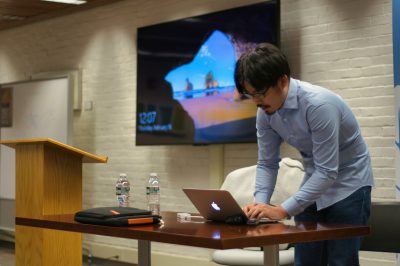
Dr. Mizuno with his committee:
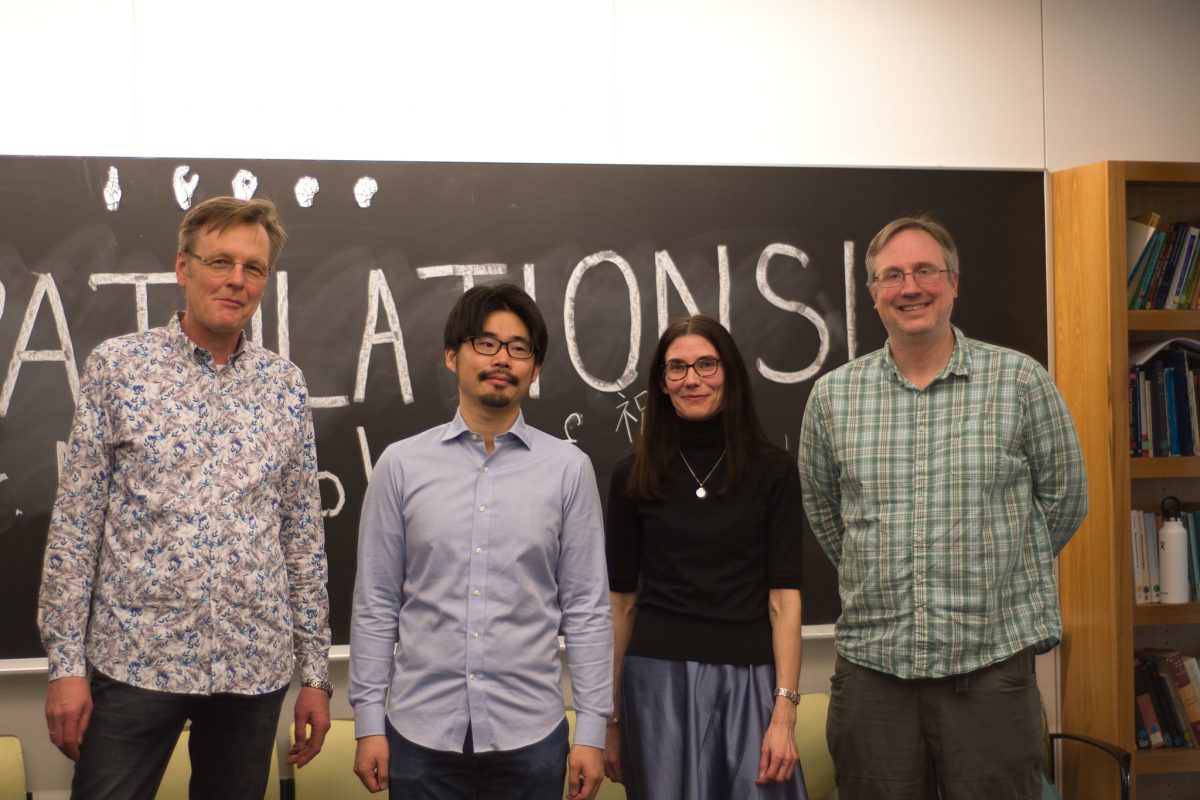
Dr. Mizuno with his well-earned cake:
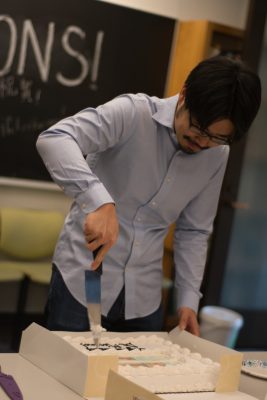
Saito Defense
Hiroaki Saito successfully defended his dissertation Ways of Saying – Synchronically and Diachronically on February 13th.
Congratulations, Hiro!
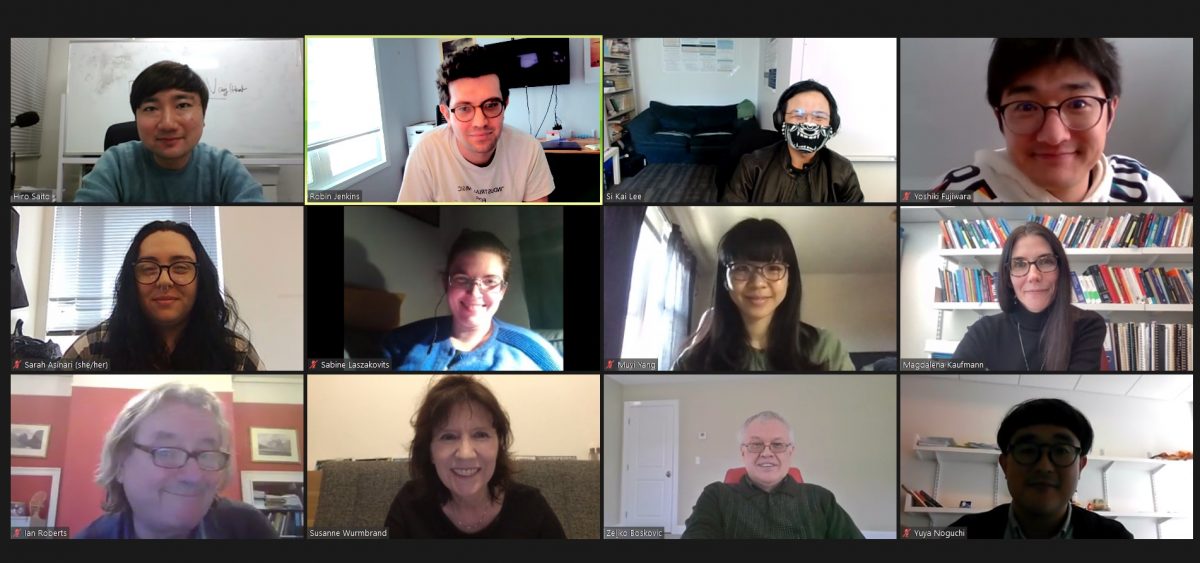
Picture: Dr. Saito after his successful defense with his committee (Željko Bošković, Magda Kaufmann, Ian Roberts, Susi Wurmbrand) and some of the audience.
Stefan Kaufmann | Talk at UCHI
Stefan Kaufmann presented his work on “Talking about time and possibility” as a fellow’s talk at the UConn Humanities Institute on February 1, 2023.
Yang Defense
Muyi Yang successfully defended her dissertation Varieties of conditionals as definite descriptions on December 15th.
Congratulations, Muyi!
Muyi defending:
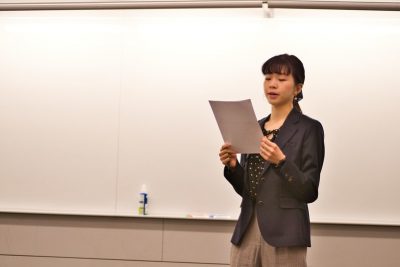
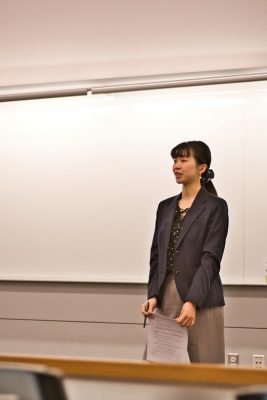
Dr. Yang with her committee:
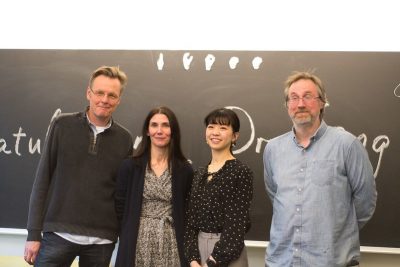
Dr. Yang with her well-earned cake:
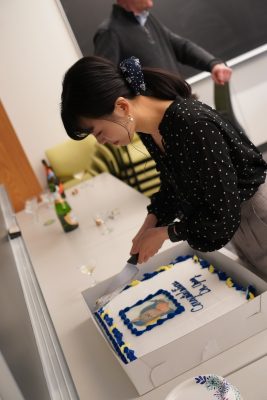
Laura Conway Palumbo
With sadness, we share the news that Laura Conway Palumbo, Ph.D. 1997, has died. Laura’s dissertation, Excavating Semantics, examined the theory and acquisition of discourse-bound pronouns, developing ideas of dynamic binding. She was an active member of the department and contributed to it in very many ways.
The following link contains her obituary, photos, and information
Lee | Glossa
Si Kai Lee’s article “On agreement-drop in Singlish: topics never agree” has just appeared in Volume 7 of Glossa, as part of the GLOWing papers 2021 collection of selected papers from the 44th Generative Linguistics in the Old World (GLOW) Colloquium. The paper can be accessed online here. Congratulations Si Kai!
Abstract: This paper examines the distribution and properties of agreement-drop constructions in Singlish, which are distinguished by the absence of overt subject agreement morphology. I demonstrate that these constructions are distinct from their minimally different fully-agreeing counterparts in that they (i) bleed object topicalisation, (ii) block the extraction of adjuncts which are lower in the structure, (iii) are scopally frozen, (iv) are unable to be embedded under regret-class predicates, and (v) impose a specificity condition on their subjects. I argue that these properties rule out prior characterisations of the alternation as the output of free variation in the PF. On the basis that agreement-drop constructions in Singlish consistently parallels topicalisation structures cross-linguistically, I sketch a syntactic account that unifies the two constructions within the syntax.